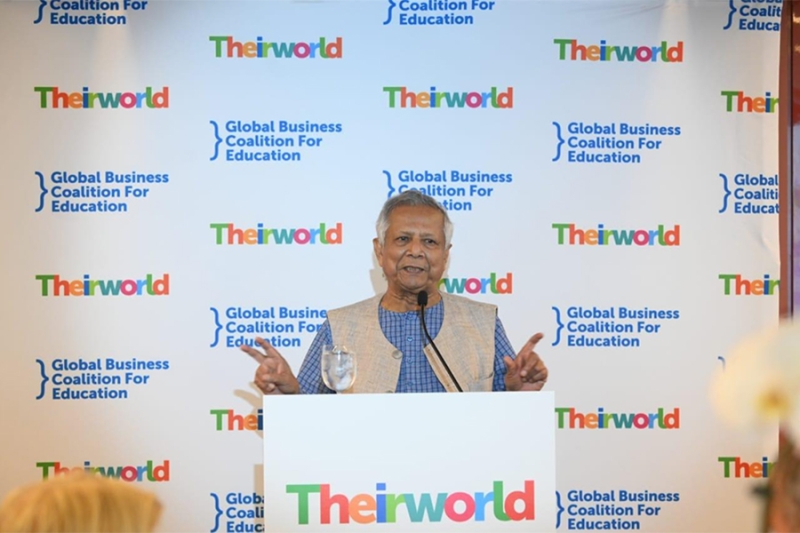- Smear campaigns being carried out to eliminate BNP: Rizvi |
- Prof Yunus Urges Economy Focused on Social Good, not Wealth |
- Dembele crowned king: PSG star wins Ballon d’Or |
- A Genocide Position Paper on the Plight of Palestine |
- Economy must move beyond narrow wealth accumulation: Yunus |
Prof Yunus Urges Economy Focused on Social Good, not Wealth

Chief Adviser Prof Muhammad Yunus on Monday urged global leaders to move beyond an economy centred on narrow wealth accumulation, advocating instead for a system that prioritizes human well-being, social justice, and environmental stewardship.
“This is not a utopian ideal. It is a necessary evolution. At the heart of this new economy lies social business,” he said while delivering the keynote speech at a UN high-level event on “Social Business, Youth and Technology” at UN Headquarters in New York. “Social business is not a niche concept; it is a fundamental principle demonstrating that business can and must exist to make a difference, not just generate profit.”
Prof Yunus traced the origins of social business to a humble one-dollar loan, noting how it has grown into a global movement addressing challenges in healthcare, renewable energy, education, and even sports. “Social businesses show it is possible to tackle the world’s most pressing issues while remaining economically sustainable,” he said.
He emphasized the need for a new civilization—one motivated not by greed, but by a shared commitment to solving human and planetary challenges. “Our current civilization is on a self-destructive path, defined by endless extraction, consumption, and accumulation. We are endangering the very planet that sustains us,” he warned.
In this new paradigm, wealth must be shared rather than concentrated. “Power held in too few hands weakens society as a whole,” he said. Business, he added, must be redefined as a vehicle for social good rather than mere personal profit. “This is the promise of social business. It is how we will truly achieve the Sustainable Development Goals,” Prof Yunus said.
He called upon youth to lead the transformation. “Unlike previous generations shaped by outdated systems, today’s young people imagine what could be, not just what is. Where imagination leads, innovation follows. If we can imagine it, it can happen; if we don’t, it never will.”
Prof Yunus highlighted the dawn of a new technological era, marked by artificial intelligence, big data, renewable energy, and other innovations capable of reshaping societies. “But their promise carries responsibility. Will these technologies become a blessing for humanity—or a source of harm? The answer is not yet written,” he said.
He stressed the importance of ethical innovation alongside technical progress. “We need leaders who ask not only, ‘Can we do it?’ but ‘Should we do it?’ Social business aligns technological advancement with social justice, equity, and environmental stewardship,” Prof Yunus added.
The Chief Adviser also introduced the concept of a world of “three zeros”: Zero Net Carbon Emissions, Zero Wealth Concentration to End Poverty, and Zero Unemployment by unleashing creativity. He encouraged young people to form 3-Zero Clubs—spaces where individuals commit to sustainable living, social entrepreneurship, and minimizing waste.
“From single individuals to families, villages, and eventually cities, these steps can build a 3-Zero world,” he said. Prof Yunus called for unity, emphasizing that the combined power of social business, youth energy, and technology can address even the most complex global crises.
Prof Yunus concluded with a vision of a new wave of civilization—built on justice, sustainability, and hope. He warned of the intertwined crises of climate change, inequality, and global conflict, urging renewed multilateral diplomacy, international cooperation, and collective commitment to sustainable development.
“Old solutions will not suffice. The world must transform—placing people and the planet above profit, and ensuring that the SDGs are achievable for all nations,” he said.

